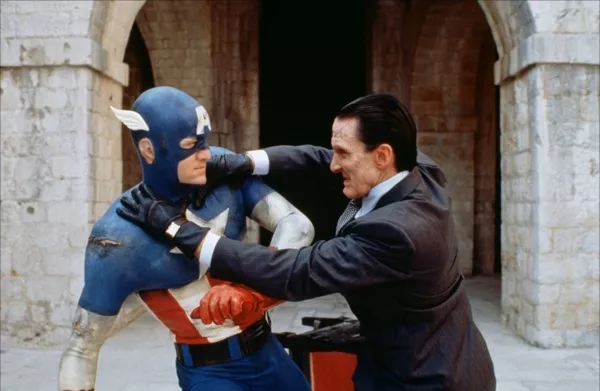
-
Matt Salinger and Scott Paulin in Captain America
CAPTAIN AMERICA (1990). No, this isn't the Captain America that recently lit up the box office; that version isn't due on DVD and Blu-ray until later this year. This also isn't the serial from the 1940s (already out on DVD) nor the 1979 TV-movie (due on DVD, along with its sequel, on Oct. 18). Rather, it's the rarely seen 1990 feature film whose only previous stateside releases were on video and laserdisc — in other words, it failed to even receive a U.S. theatrical run after its completion, instead sitting on the studio shelf for two years (it did play internationally). Even now, it's only showing up as a MOD (Manufacturing-On-Demand) title, meaning it won't be readily available at your local video outlets (Amazon and other online sites carry it, though). Truthfully, the film isn't quite as bad as its reputation, with its bold ambitions mainly neutralized by the lack of skill on the part of director Albert Pyun (Cyborg, Kickboxer 4) and the lack of finances on the part of notorious cheapo producer Menahem Golan (of Cannon Group infamy). In a role absurdly sought by Arnold Schwarzenegger, Matt Salinger is actually pretty good as Steve Rogers, who becomes the super-soldier Captain America and soon finds himself squaring off against the villainous Red Skull (Scott Paulin) during World War II. Cap fails to win that skirmish but gets another chance approximately 50 years later, after he's thawed out from a lengthy stint in the Alaskan ice and discovers that the Red Skull is still up to his murderous ways. The microscopic budget appears to have been spent on Cap's costume and shield (both are passable ... if you squint) and a recognizable supporting cast (including Ned Beatty, Ronny Cox and Darren McGavin), leaving nothing for convincing action sequences or even an interesting screenplay. Still, it's no worse than those infinitely more expensive Fantastic Four dogs that came out a few years ago.
The only DVD extra is the trailer.
Movie: **
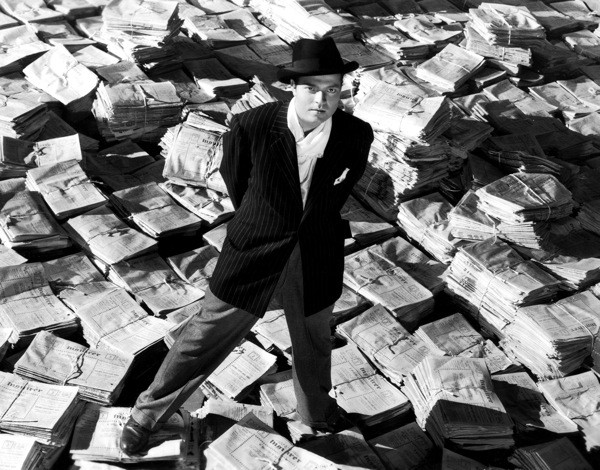
-
Orson Welles in Citizen Kane
CITIZEN KANE (1941). Orson Welles' Citizen Kane has been cited as the greatest film ever made from so many different quarters — the American Film Institute, the long-running Sight and Sound survey, even Creative Loafing's own poll way back in 1998 — it's a wonder that a Congressional law hasn't been passed making it required viewing for anyone who claims they like movies. With his first picture, writer-director-producer-star Welles introduced and/or perfected a slew of innovative cinematic techniques, as well as related a damn good mystery ("Rosebud") and an even better character study. But those aren't the only reasons this film about the rise and fall of newspaper magnate and empire-builder Charles Foster Kane (largely based on William Randolph Hearst) endures; what really provides it with its emotional hook is how perfectly Welles captures the feelings of loneliness, alienation and despair that often all but define human existence. The sequence in which Kane, who has everything except what's most important to him, finally cracks and destroys the room around him in an almost robotic manner is one of the most haunting ever committed to celluloid — yet it's merely just one more great scene in a movie packed with 'em. This earned nine Academy Award nominations (including Best Picture), but the controversy, the surrounding politics and the organization's own frequent inability to recognize masterpieces led to it winning a single Oscar: Best Original Screenplay for Welles and co-scripter Herman J. Mankiewicz.
The 3-Disc Ultimate Collector's Edition on Blu-ray includes a wealth of supplemental material, including a 48-page book with photos and facts; a 20-page 1941 souvenir program reproduction; five poster and lobby card reproductions; and 10 reproductions of studio memos and correspondence. Extras on the Blu-ray itself include audio commentary by film critic Roger Ebert; separate audio commentary by filmmaker and Welles biographer/friend Peter Bogdanovich; interviews (from the mid-1990s) with Ruth Warrick (who played Emily Kane) and The Sound of Music director Robert Wise (whose early career as an editor included his Oscar-nominated work on Kane); a photo gallery with commentary by Ebert; photos and correspondence regarding a deleted brothel scene; and storyboards. The other two discs are standard DVDs containing the 1995 Best Documentary Feature Oscar nominee The Battle Over Citizen Kane and the award-winning 1995 HBO movie RKO 281, starring Liev Schreiber as Welles, James Cromwell as Hearst and John Malkovich as Mankiewicz.
In major related news, Welles' second movie, 1942's The Magnificent Ambersons, is finally making its DVD debut; unfortunately, it's only available when purchased with this set, and only available as an Amazon Exclusive. Boo.
Movie: ****
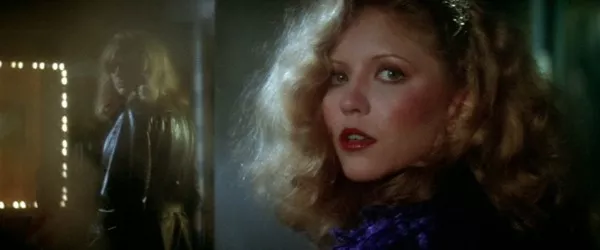
-
Nancy Allen in Dressed to Kill
DRESSED TO KILL (1980). Brian De Palma's career has been idling for quite some time now — his last two films, 2006's The Black Dahlia and 2007's Redacted, were savaged by critics and ignored by audiences (Redacted even made my own year-end 10 Worst list) — so we should thank various studios' home entertainment arms for the recent releases of some of his earlier, better works. On the heels of Criterion's Blow Out, Warner/Columbia's Obsession and Universal's Scarface comes Fox/MGM's Blu-ray edition of what arguably might be his most controversial movie (and that's saying a lot). Dressed to Kill remains a prime example of how De Palma is able to marry his awesome technical prowess to the material, using his dazzling feats of cinematic derring-do to propel his stories rather than bury their weaknesses. It uses Alfred Hitchcock's Psycho as a starting point before veering off in its own deliciously twisted direction, centering on a sexually frustrated housewife (Angie Dickinson), her patient therapist (Michael Caine), an imperiled prostitute (a wonderful Nancy Allen) and a razor-wielding psychopath. Perhaps the first movie that, as a teen, made me aware of the art of filmmaking and, by extension, the necessity of film criticism, this compelling thriller still floors me after all these years. Pino Donaggio's music score, alternately dreamy and frenzied, is simply wonderful; ditto Gerald Greenberg's editing and Ralf Bode's camerawork (the silent cat-and-mouse sequence set inside a museum is a remarkable set-piece).
Blu-ray extras include an informative 44-minute making-of featurette; a superficial 10-minute piece about De Palma's battles with both the ratings board and the social critics who condemned the film as misogynistic; an amusing comparison between the unrated, R-rated and TV network versions of the film; and a 6-minute discussion of the film by Keith Gordon (who played Dickinson's teenage son).
Movie: ****
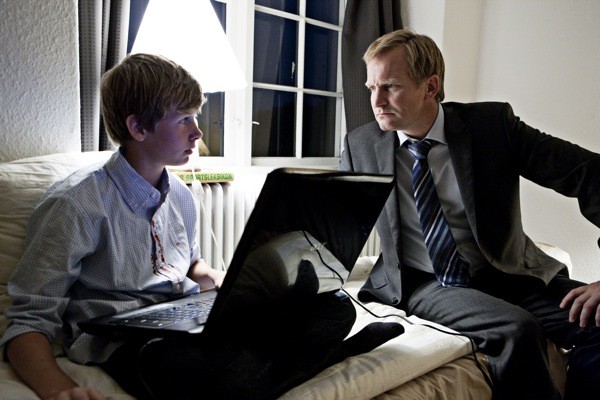
-
In a Better World
IN A BETTER WORLD (2010). This Danish drama recently won the Academy Award for Best Foreign Language Film, which means it places a distant second to Melissa Leo's scenery-chewing in The Fighter as the least deserving recipient at this year's ceremony. That's not to say it's a bad movie, but it's hardly satisfying to see the prize go to what's essentially a sincere afterschool special with subtitles. Elias (Markus Rygaard), nicknamed "Ratface" by the thugs at his Danish school, endures daily abuse until new student Christian (William Johnk Juels Nielsen) becomes his protector and friend. When he's around, Elias' dad Anton (Mikael Persbrandt), a doctor who spends a lot of time treating impoverished locals in Africa, tries to instill a pacifist nature in both boys, but Christian, full of anger and resentment over his mom's death, resists, instead involving his weak-willed friend in acts of rebellion and retribution that grow increasingly dangerous. Perhaps had they focused solely on the boys, director Susanne Bier and scripter Anders Thomas Jensen might have pulled off a sturdy story involving moral quandaries; indeed, this portion of the film generally works, bolstered by excellent work from the two teen actors. Alas, the inclusion of the African sequences not only renders the plotting overly schematic (the parallels between the two halves are often glaringly simplistic) but creates an imbalance that the film never corrects — make no mistake, schoolyard bullying is awful, but it can't compare to a warlord slicing open the bellies of pregnant women with machetes simply because he can. The final half-hour is the sinker, as certain characters are let off the hook, everyone bonds in warm embraces, and life lessons are handed out like candy on Halloween.
Blu-ray extras include audio commentary by Bier and editor Pernille Bech Christensen; 14 minutes of deleted scenes; and a 16-minute interview with Bier.
Movie: **1/2
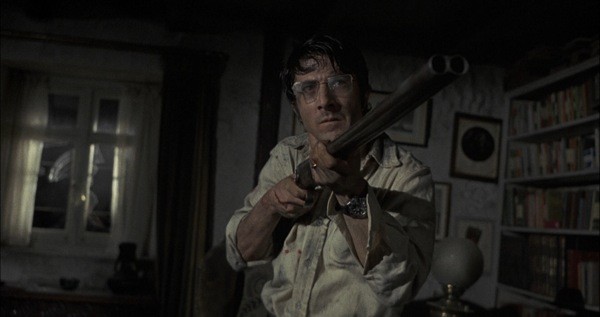
-
Dustin Hoffman in Straw Dogs
STRAW DOGS (1971). Released during a period in American cinema when controversial movies often seemed like the rule rather than the exception, Sam Peckinpah's drama ranked among the most notorious of this wild bunch. Creating a disturbing mood further fueled by the picture's underlying themes, this stars Dustin Hoffman as David Sumner, a meek mathematician who, with his beautiful British wife Amy (Susan George) in tow, relocates to a small English village, whereupon the local yahoos belittle him at every turn and eventually rape his younger spouse. Amy's reaction to one of the assaults, as well as the seeming assertion that Hoffman can only become a "man" once he turns from peacenik to warrior, has led to the film's infamy — Pauline Kael called it "a fascist work of art," while Roger Ebert wrote that it was "totally committed to the pornography of violence." For his part, Peckinpah insisted that his intentions were misinterpreted, and the film is ambiguous enough (its greatest strength) to allow him the benefit of the doubt. At any rate, it features excellent pacing that uncomfortably draws audiences into a desire to see blood spilled at the end, and it's all backed by Jerry Fielding's appropriate, Oscar-nominated score.
The Blu-ray includes the 118-minute unrated version, not the 113-minute R-rated cut. Extras consist solely of three short TV spots and the theatrical trailer.
Movie: ***
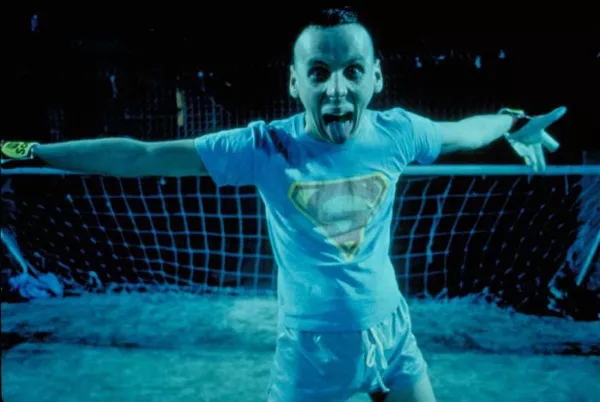
-
Ewan Bremner in Trainspotting
TRAINSPOTTING (1996). A pop culture sensation that drew notice to its own urgency and immediacy — it was a gargantuan success in its UK homeland and a strong art-house performer here in the US — this often riotous, often frightening adaptation of Irvine Welsh's acclaimed novel centers on the escapades of a gang of slackers immersed in the Edinburgh drug scene. Foremost among the group is Renton (Ewan McGregor), a heroin addict who periodically tries to tear himself away from both his destructive lifestyle and the bad influence of his buddies — scheming Sick Boy (Jonny Lee Miller), easy-going Spud (Ewan Bremner) and vicious Begbie (Robert Carlyle). Despite Renton's boast that "if you take the best fucking orgasm you ever had and multiply it by 1,000, you're still not even close" to the highs of a heroin fix, director Danny Boyle and scripter John Hodge (earning a Best Adapted Screenplay Oscar nod) can hardly be accused of taking a pro-drug stance, though some clueless op-ed pieces on this side of the Atlantic nevertheless made that charge, as did grasping politician and presidential wanna-be Bob Dole. If anything, the pair are honest enough not to take any position, preferring to tell it as they see it (complete with soiled bedsheets and hallucinatory odysseys) and then letting us make up our own minds in a soberly fashion.
Blu-ray extras include audio commentary by McGregor, Boyle, Hodge and producer Andrew MacDonald; 11 minutes of deleted scenes; a 10-minute making-of piece; and footage from its Cannes Film Festival showing.
Movie: ***1/2
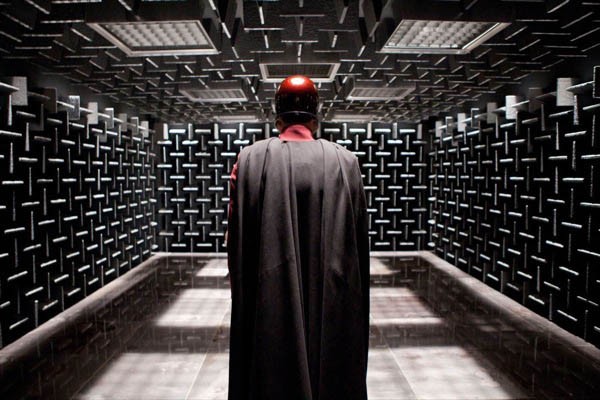
-
MAGNETIC: Michael Fassbinder in X-Men: First Class
X-MEN: FIRST CLASS (2011). X-Men: First Class is the best X-Men flick since the 2000 original, and while it's no match for either The Dark Knight or Superman, it still ranks among the top 10 movies to date in this specialized genre. It's that good. Working from a plot fashioned by six writers (including himself), director Matthew Vaughn employs a generous 132-minute running time in order to give all the characters and their predicaments breathing room. Front and center are Charles Xavier (James McAvoy) and Eric Lehnsherr (Michael Fassbinder), two powerful mutants who team up to stop a former Nazi (Kevin Bacon) from starting World War III during the height of the Cold War. They also elect to mentor other mutants all looking for acceptance in a world that is just now becoming aware of their presence but already fearing and despising them for being different. Both Charles and Eric are happy to serve as mentors to these tortured youths — among them, the shape-shifting Raven/Mystique (Winter's Bone Oscar nominee Jennifer Lawrence) — but to different ends: Charles believes that mutants and humans can eventually coexist peacefully, while Eric feels that humans deserve only contempt and must bow to mutant superiority. Vaughn appears to be something of a mutant shape-shifter himself, moving from the steely coolness of Layer Cake to the fairy tale romance of Stardust to the relentless brutality of Kick-Ass. Here, he ably demonstrates that he can tackle a mammoth Hollywood blockbuster without getting swallowed whole by the experience. Crucially, he never loses sight of the fact that the characters matter far more than the effects work (though the CGI is excellent), and such an approach results in some memorable characterizations as well as one standout performance by Fassbinder as Eric Lehnsherr/Magneto.
Blu-ray extras include the Cerebro: Mutant Tracker interactive database; X Marks the Spot, an interactive feature allowing access to behind-the-scenes material such as interviews; a seven-part, 70-minute making-of piece; and 14 minutes of deleted and extended scenes.
Movie: ***1/2
